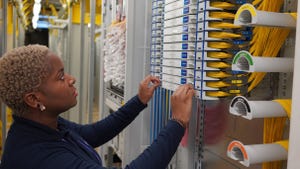
Celebrities just can't be trusted at Christmas. If they aren't partying with other celebrities in breach of coronavirus restrictions, they're inciting a social media panic about the evils of 5G. After the mental rigors of lockdown, mixing a few doses of seasonal eggnog with a David Icke or Amanda Holden – two British celebrities who this year blamed coronavirus on 5G – could unleash a Twitter storm of conspiracy theories.
That risk has prompted Mobile UK, a trade association that represents the country's mobile operators, to launch its own public safety campaign this Christmas. These usually come from the police, urging people not to drink and drive. Mobile UK is urging celebrities to behave responsibly and lay off the tweets.
You can envisage the danger if a booze-soaked Holden, recumbent and bored after the exertions of a long Christmas lunch, starts communicating her mad theories to the 1.9 million people she counts as Twitter followers. Inspired by celebrity messages, halfwits have this year carried out 133 arson attacks on UK telecom masts and other mobile equipment, according to Mobile UK. Since April, there have also been 300 recorded incidences of abuse experienced by UK telecom staff and engineers.
Want to know more about 5G? Check out our dedicated 5G content channel here on Light Reading.
Until the recent arrival of vaccines, the wildest theory was that 5G masts were spreading the pandemic through radiofrequency signals – even, says Mobile UK, "when it is clear this is biologically impossible." It should be clear. It isn't to men like Icke, a former sports pundit who believes Earth has been colonized by reptilian extra-terrestrials disguised as humans. Presumably, he thought the science fiction series V was a documentary.
Icke seems beyond redemption. Mobile UK's campaign is probably aimed at the likes of Holden, who has insisted her tweeting of 5G conspiracy theories was a mere slip of the thumb. Amanda, we sympathize. After a hard day's slog judging contestants on Britain's Got Talent, or recording your new Songs from my Heart album, it must be easy to find yourself carelessly disseminating misinformation. Given the stress of lockdown – during which Holden's main activity has been to record saucy videos of herself washing windows in a skimpy Santa costume or taking out the trash in a dress – those social-media blunders could befall anyone.
As I’m #HomeForChristmas I thought I’d clean the windows 😂❤️🎄https://t.co/o0VOgHYdq6 pic.twitter.com/ehtJPFlVPz
— Amanda Holden (@AmandaHolden) December 7, 2020
The latest theorizing is that vaccinations developed by companies including Pfizer and Moderna will turn people into walking 5G antennas. It sounds like the mother of all cost-saving exercises for the mobile industry. By Christmas, there could be several thousand octogenarians with the ability to transmit 5G signals, avoiding the need for any of those pricey masts. Provided there were no risk of contagion, BT shareholders would be delighted. So might some residents of Millbrook in Southampton, where a 20-meter-high 5G mast looks like one of those drop towers at amusement parks. You could even site vaccinated pensioners outside football stadiums during matches for a temporary low-latency connection.
Alas, "any link between 5G and vaccines has no basis in science," says Mobile UK. And its concern about vandalism should worry everyone, celebrities included. Mast attacks this year led to a service outage at one of the UK's Nightingale Hospitals, set up to treat coronavirus patients. They even damaged telecom equipment that had nothing to do with 5G. Next time she's uploading a video of herself gardening in a bikini, Holden might want to remember that.
Related posts:
— Iain Morris, International Editor, Light Reading
Read more about:
EuropeAbout the Author(s)
You May Also Like




.jpg?width=300&auto=webp&quality=80&disable=upscale)







